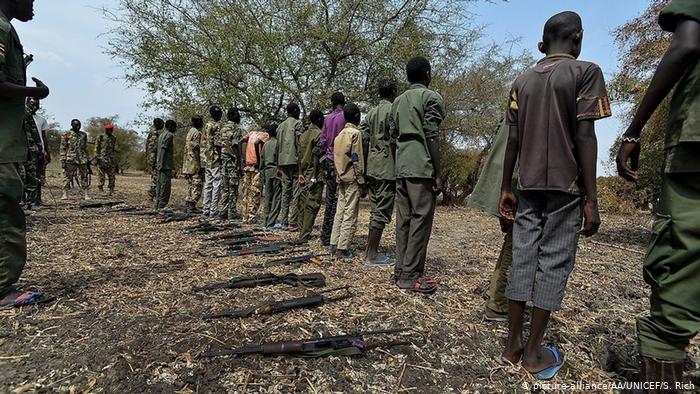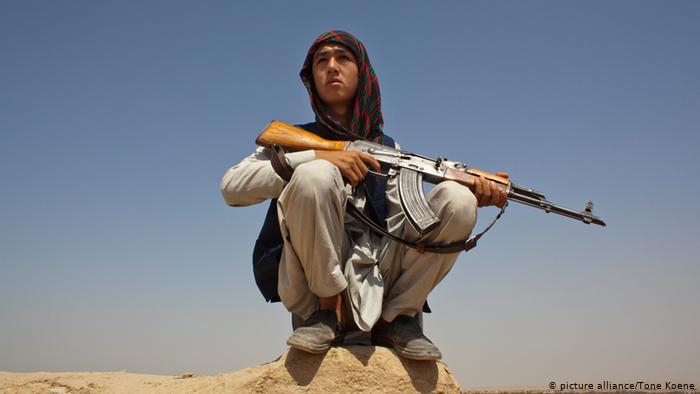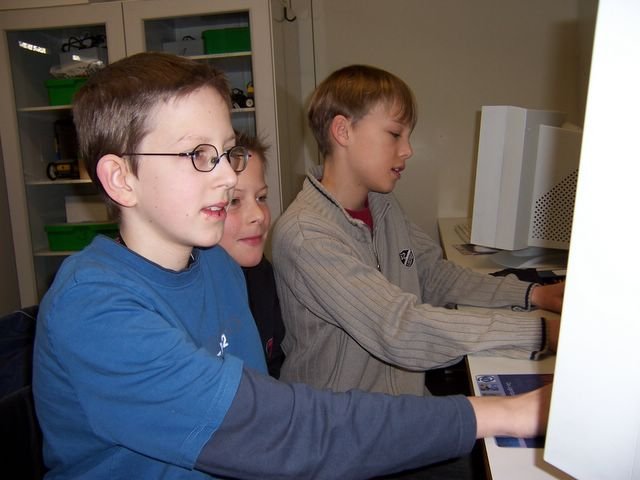Every year on February 12th the "Children’s Soldiers Day" to the many young people who take part in armed conflicts worldwide. Most of them fight in weak, torn states.

One of the most important educational goals was numbness against extreme violence. So the children had to sit in front of a screen and watch videos of beheadings and other executions, over and over again, for several weeks. It was only when they got used to this brutality that the children in the eyes of their teachers had achieved their learning goal. Last year, DW told two young Yazidis, aged 11 and 13, who had been kidnapped in Iraq by the jihad organization Islamic State (IS) and spent nine months in its training camps.
Even today, one of the two brothers Adel and Asse reports, months after their escape from the camp, the pictures often robbed him of sleep. It was normal for the IS fighters to kill people. They would have wanted to teach the kidnapped boy that too. "They told us: You have to learn this because we will take you to another Arab country where you have to cut heads."

Brothers Adel and Asse: Forcibly recruited by IS
But executions were also only a means of further brutalizing the kidnapped children. The real goal was to send them into battle – preferably with an explosive belt around their waist. Continuous brutalization should also prepare for this. The IS terrorists tried to remove the last inhibitions or fears from the children by instilling them in drugs.
A quarter of a million child soldiers worldwide
The fate of the two young Yazidis is only one of countless cases in which children are abused as soldiers. The United Nations Children’s Fund estimates that up to 250,000 boys and girls are suffering this fate worldwide.
Child soldiers are considered to be in accordance with the relevant Paris Principles, formulated in 2007 and signed by 105 states – including Germany "any person under the age of 18 who is recruited or used by armed forces or armed groups (…), including children who have been used as fighters, cooks, porters, messengers, spies or for sexual purposes."
The United Nations publish a so-called annually "List of shame", in which the most recent figures for child soldiers are documented. There are currently 59 armed groups and armies from 14 countries on it.
Fight to eat
The phenomenon of child soldiers is most widespread in Africa. There they are used primarily in countries torn apart by civil wars or strong internal conflicts. In Nigeria, for example, they are forcibly recruited by the jihadist terrorist group Boko Haram, in Somalia by the Al-Shabab militia, and in Mali by the Islamist rebels. In South Sudan, they fight on both sides of the rival groups: on that of incumbent President Salva Kiir Mayardit as well as that of his former deputy Riek Machar.

Young fighters in the ranks of the Houthis in Yemen: "Nightmares, alienation, outbursts of anger"
UNICEF conducted interviews with several of the children fighting in the two groups. Not all of them have been forced to fight. "Our enemies killed my sister and uncle", UNICEF quotes a thirteen-year-old. "That’s why I joined the militia." Others were just happy to get something to eat.
In the service of the revolutionaries
Even outside of Africa, child soldiers are predominantly found in countries with strong internal tensions or conflicts. In Afghanistan and Pakistan, they are recruited by the Taliban, in Yemen they fight in all parties involved in the civil war: the Houthi rebels, the troops of displaced President Mansur Hadi, and jihadist groups such as Al Qaeda and IS.
But even left-wing extremist groups are not afraid to use children in combat areas. In the Philippines, for example, the communist rebel organization counts "New Peoples’ Army" (NPA) also children in their ranks. In Colombia, until the ceasefire in June 2016, those also took effect "Colombia’s Revolutionary Armed Forces" (FARC) on children’s service at the gun.

Boy on a tank in Eastern Ukraine (2015): Accustomed to life under arms
In Ukraine, children do not take part in the fighting. Through the however, they have grown used to living under arms.
Physical and psychological consequences
The long-term consequences for the psychological and physical well-being of children weigh heavily. According to a study by Amnesty International, they are aggressive and violent, especially in the first period after being released from the respective combat groups. "They suffer from nightmares, alienation, outbursts of anger and an inability to socialize."
They often don’t know their families either, because they were separated from them at a very young age. In extreme cases, they fought against the community from which they originally came. "I don’t want to go back to my village because I burned down all the houses there", Amnesty quotes a sixteen-year-old fighter from Sierra Leone. "I don’t know what, but people would definitely hurt me. I don’t think I’ll ever be taken back to my village."
According to the tenor of the studies, the phenomenon of child soldiers will at best be resolved in the long term. As long as rebel groups, terrorist militias and paramilitary organizations wage their so-called irregular war, the weakest of the weak are recruited to participate.
The editors recommend
Child soldiers with "Islamic state"
The terrorist organization "Islamic state" is increasingly being pushed back militarily. Now the militia is increasingly using children and adolescents as suicide bombers. From Erbil Judit Neurink. (10.17.2016)
UNICEF: More child soldiers in South Sudan again
The bloody fighting in South Sudan flared up again in July. In view of this escalation, UNICEF complains that the conflict parties in the civil war country are recruiting additional child soldiers. (08.19.2016)
Amnesty: Mali violates UN Convention on the Rights of the Child
Amnesty accuses Mali of violations of the UN children’s rights convention: militias are also recruiting minors in the country. If the children are arrested, they are often exposed to further human rights violations. (08.21.2014)
- date 02/12/2017
- Writer / Author Kersten Knipp
- topics pagesFARC
- TagsChild soldiers, Africa, jihadists, FARC
- Feedback: Send us your feedback!
- To pressPrint Page
- Permalink https://p.dw.com/p/2XOlZ
more on the subject

France increases deployment in the Sahel region on January 13, 2020
At an anti-terrorist summit with Macron, five heads of state in the crisis region supported France’s continued military activity there. In some places there had previously been criticism of the French commitment.

Kramp-Karrenbauer wants "robust" Bundeswehr mandate for Africa 29.12.2019
Defense Minister Kramp-Karrenbauer has advocated that the approximately 1,100 Bundeswehr soldiers in Africa will in future also be sent to combat operations. However, the majority of Germans have concerns.

Crisis Summit on Terror in the Sahel Zone January 10, 2020
Heads of state from West Africa and France meet in Pau, France, on Monday. The summit is intended to seal a new strategy in the fight against terrorism. But resistance in Africa to foreign soldiers is growing.
- date 02/12/2017
- Writer / Author Kersten Knipp
- topics pagesFARC
- TagsChild soldiers, Africa, jihadists, FARC
- Send us your feedback!
- To pressPrint Page
- Permalink https://p.dw.com/p/2XOlZ
Can Germany settle the dispute with Iran?
In the conflict with Iran over the nuclear agreement, Germany, along with France and Great Britain, wants to increase the pressure on Tehran. You have a so-called "Dispute settlement mechanism" started.
Iran’s leadership is obviously nervous
After the plane was shot down in Iran, the mullahs in Tehran are under high tension. They are faced with the allegation that they have ordered violence against demonstrators and are threatening internally and externally.
China no longer manipulates the yuan, according to the United States
In the trade dispute between the USA and China, there is another signal of relaxation, shortly before the planned signing of a first partial agreement. The US withdraws the accusation of currency manipulation.
France increases deployment in the Sahel region
At an anti-terrorist summit with Macron, five heads of state in the crisis region supported France’s continued military activity there. In some places there had previously been criticism of the French commitment.
Human Rights Watch: China – "Super meltdown for human rights"
Suppression, censorship, manipulation: In the World Report 2020, Human Rights Watch pillars China very clearly and emphatically. The country existentially threaten international human rights.
Nuclear Agreement on the Abyss
In the struggle for the Iranian nuclear agreement, the EU countries involved triggered the contractually agreed dispute settlement mechanism. Is this the last attempt at rescue – or even the death blow for the contract?
Cleans Erdogan Turkish State Theater?
At least 150 theater professionals were fired without reason in Turkey. And that despite the prospect of permanent positions. According to DW actors, political cleansing is assumed.
Trump, the Iran crisis and the pre-election campaign by the US Democrats
The presidential candidates of the US Democrats come together for their first TV debate of the election year. The conflict with Iran will be a major issue. Biden and Co. find clear words for Trump’s politics.
RELATED ITEMS
-

Child soldiers fight in 14 countries, world, dw
Around 250,000 girls and boys are forced to fight worldwide. They are abused, they kill and they die. On the part of rebels, however…
-

Children have always used lego weapons – no big deal
As the virtual world increasingly dominates children’s play, Lego is the last game in the real world – I can live with it a bit…
-

Children in one world: children in war 1
Internet project work: A class 6A web log from the Rudolf Diesel High School in Augsburg on the topic of children in one world Thursday, March 03, 2005…
-

Lwickel – for small and large cough children – children like home remedies
The oil stain is a tried and tested application for coughs – in Austria it is also known under the name Schmalzfleck. This warm edition is the…
